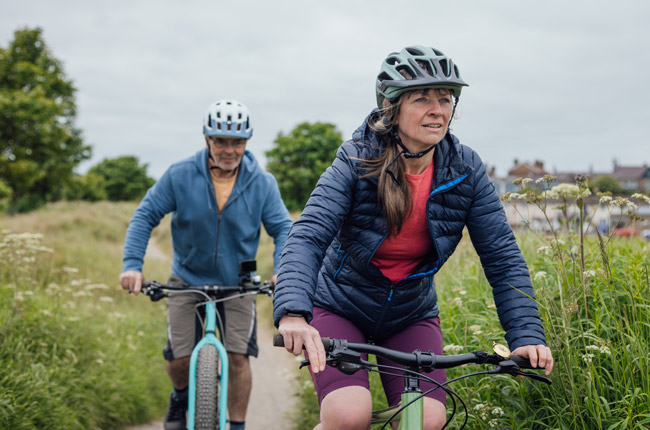Scientific abstract
Background
Although cancer-related fatigue is one of the most common and distressing side-effects in cancer survivors, the underlying biological mechanisms remain to be elucidated. In the Netherlands, nearly 1 in 2 colorectal cancer (CRC) survivors suffer from persisting fatigue complaints.
Observational studies in CRC survivors have found that physical activity is associated with lower fatigue levels, whilst sedentary behaviour has been associated with increased fatigue. Furthermore, intervention studies have shown that exercise can reduce cancer-related fatigue, but there is still substantial uncertainty about which type of intervention (eg aerobic vs anaerobic exercise) is most effective.
More insight into the biological mechanisms linking sedentary behaviour and physical activity with fatigue in CRC survivors will help to better understand the effects of different types of interventions.
Hypothesis and objectives
Health effects of sedentary behaviour and physical activity in cancer survivors are hypothesized to be mediated by adiposity-related metabolic dysfunction and chronic low-grade inflammation, which have also been associated with cancer-related fatigue.
As beneficial effects on cancer-related fatigue have been found for strength exercise, impaired muscle function and metabolism could represent an additional important mechanism. Therefore, our hypothesis is that metabolites of energy and fat metabolism, muscle protein metabolism and inflammation, and anthropometric measures of adiposity and muscle function mediate associations of sedentary behaviour and physical activity with fatigue in CRC survivors.
Our objectives are to identify metabolites and anthropometric measures associated with (1) sedentary behaviour and physical activity, and (2) with overall fatigue and subdomains of fatigue.
Thirdly, we will explore whether the identified metabolites and anthropometric measures mediate associations of sedentary behaviour and physical activity with fatigue in CRC survivors and examine the biological mechanisms involved.
Settings and methods
Data from an ongoing prospective cohort study in CRC survivors (EnCoRe study) with repeated measurements at six-weeks (n~327), six-months (n~252), one-year (n~203) and two-years (n~106) post-treatment will be used. Sedentary behaviour and physical activity are assessed by accelerometers and questionnaires.
Fatigue and subdomains of fatigue (subjective fatigue, concentration, motivation, and activity) are measured by a validated questionnaire. Anthropometric measures of adiposity and muscle function are assessed and repeated blood samples are collected. Targeted metabolomic analysis will be conducted to determine plasma concentrations of ~150 well-defined metabolites using the validated BIOCRATES AbsoluteIDQp180 kit and state-of-the-art tandem mass spectrometry techniques.
Confounder-adjusted linear mixed models will be applied to investigate longitudinal associations: (1) of sedentary behaviour and physical activity with metabolite concentrations and anthropometric measures, and (2) of these concentrations/measures with overall fatigue levels and subdomains of fatigue.
Metabolites and anthropometric measures identified through both strategies will be further investigated through mediation analysis.
Impact
The proposed project will be the first to investigate biological mechanisms linking sedentary behaviour and physical activity with fatigue in CRC survivors. The results will provide leads for developing tailored interventions and guidelines on physical activity and sedentary behaviour for CRC survivors.
These interventions and guidelines will more effectively prevent or reduce fatigue by targeting specific biological mechanisms (eg anaerobic exercise if mainly muscle function is identified as linking biological mechanism).
Plain language abstract
Background
Fatigue is one of the most common and distressing side-effects of cancer and its treatment. Among colorectal cancer survivors, nearly 1 in 2 individuals suffer from persisting fatigue complaints. Importantly, these complaints can limit their ability to perform daily activities and thereby have a large impact on their lives.
Previous studies found that colorectal cancer survivors with higher levels of physical activity report less fatigue, whilst survivors who engage more in sedentary behaviour (ie sitting/lying during the day) report more fatigue.
Furthermore, studies have found that exercise interventions can reduce fatigue in breast cancer survivors, but there is still substantial uncertainty about which type (eg strength or endurance training) and intensity of exercise would be most effective for colorectal cancer survivors.
More insight into the biological mechanisms linking sedentary behaviour and physical activity with fatigue in colorectal cancer survivors will help to better understand effects of different types of interventions.
Aims and objectives
We aim to investigate the biological mechanisms linking sedentary behaviour and physical activity with overall fatigue and subdomains of fatigue (subjective fatigue, concentration, motivation, and activity) in colorectal cancer survivors.
In particular, we intend to identify which metabolites (ie small molecules involved in several important biological processes) and body composition features of obesity and muscle strength, are associated with sedentary behaviour and/or physical activity, and with fatigue domains in the period from six weeks until two years after treatment for colorectal cancer.
By linking identified metabolites and body composition features to biological mechanisms, we will be able to investigate which mechanisms underlie associations of sedentary behaviour and physical activity with fatigue in colorectal cancer survivors, which is currently unknown.
How it will be done
Within the ongoing EnCoRe study, colorectal cancers survivors are included at diagnosis and followed up until two years post-treatment. We will use data collected during repeated measurements at six-weeks (~327 measurements), six-months (~252), one-year (~203) and two-years (~106) after end of treatment.
At these measurements, information is collected on sedentary behaviour and physical activity (by accelerometers and questionnaires), fatigue and subdomains of fatigue (questionnaire) and body composition features (measured). Blood samples collected at these measurements will be analysed in the laboratory to determine concentrations of ~150 well-defined metabolites.
We will use these data to identify which metabolites and body composition features are associated with sedentary behaviour and/or physical activity and fatigue. We will explore whether these metabolites and body composition features mediate associations of sedentary behaviour and physical activity with fatigue in colorectal cancer survivors and identify associated biological mechanisms.
Potential impact
The proposed project will be the first to investigate biological mechanisms linking sedentary behaviour and physical activity with fatigue in colorectal cancer survivors. The results will contribute to the development of tailored interventions and guidelines on physical activity and sedentary behaviour for colorectal cancer survivors.
These interventions and guidelines will more effectively prevent or reduce fatigue complaints in these individuals by targeting specific biological mechanisms (eg muscle strength exercise if mainly muscle function is identified as a linking biological mechanism).



